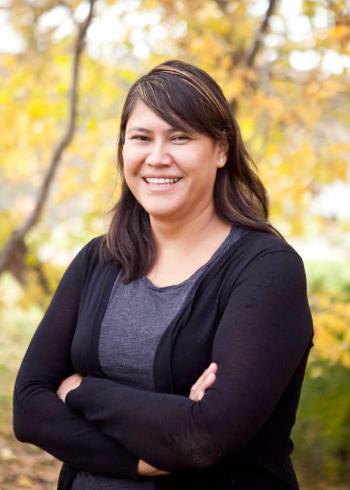Image Caption
By Shari Narine
Windspeaker Contributor
SADDLE LAKE CREE NATION, Alta.
There is probably no one more surprised than Dr. Nicole Cardinal to learn she has been named a recipient of an Alumni Horizon Award from the University of Alberta.
“I wasn’t really actually expecting to be getting an award from them,” she said. “I think it … has do with taking part in medical education.”
Simple in its concept, it took more than a year for everything to be put in place before medical students started doing rural rotations or electives in family medicine at both the Saddle Lake Health Care Centre, where Cardinal practises, and the St. Theresa Health Centre in St. Paul, where Cardinal has emergency room privileges.
“We’ve kind of geared this elective towards learning about Aboriginal people and Aboriginal health,” said Cardinal.
It’s a fitting goal considering that one of the calls to action from the Truth and Reconciliation Commission is to improve health care for Indigenous peoples by bridging the gap in disparity between Aboriginal health care and non-Aboriginal health care and making health care easier to access for Indigenous peoples, she points out.
“By exposing medical students to reserves and Aboriginal people in general, our hope is that when they encounter Aboriginal people in the hospital they will have some sort of cultural understanding about them,” said Cardinal.
Only about 10 students from St. Paul and medical residents have gone through the month-long rotation and Cardinal says it’s still too early to tell how effective the experience has been, but at first blush it looks as if she’s accomplishing some of the goals she set out to hit.
“They’re just surprised to see all the barriers that First Nations people experience trying to access health care is the biggest thing,” said Cardinal.
Students and residents have discovered first-hand the poor road conditions, inadequate and crowded housing, and the high cost of food.
Cardinal sees the rotation in her community and nearby town of St. Paul as having a two-fold impact. First, the students and residents are getting to understand on-reserve conditions while learning about First Nations people. And, even if they don’t end up practising medicine on either a reserve or in rural Alberta, they will understand the realistic aspects of recommending follow-up treatment like physiotherapy in Edmonton for a patient who comes from a reserve or a rural community.
Cardinal has been practising medicine at the Saddle Lake Health Care Centre for about two-and-a-half-years now. After graduating from the University of Alberta in 2012 she first worked in northern Saskatchewan.
“I think I always knew I was going to go home to work eventually. I think that it’s important to stay closer to your roots and contribute back because my reserve has actually helped fund my education,” she said.
Cardinal started university with the intention of getting her Bachelor of Science degree. She knew she wanted to work in the health care field, but wasn’t clear in what area.
“I knew I wanted to do something more hands on and more with people,” she said.
Cardinal doesn’t feel that her approach to medicine is different than any other physician, but she does say she is open to traditional medicine and “our culture ways when I deal with patients.”
For First Nations students who are interested in pursuing a career in the medical field, Cardinal has this to say:
“It’s a tough job. There’s a lot of social situations and lots of social issues that I can’t help people with. … It’s something you’re going to be working towards becoming a better doctor pretty much every day because you’re always reading, you’re always learning, you’re always doing new thing as well.”
Cardinal is one of four alumni to be receiving the Alumni Horizon Award on Sept. 25. The award recognizes the outstanding career achievements and contributions of recent graduates.

